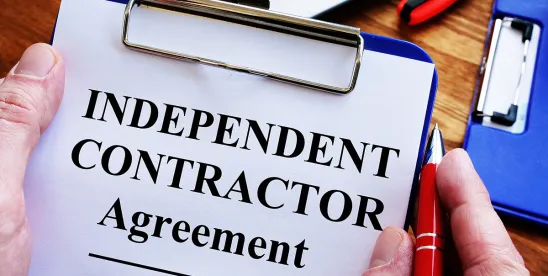Takeaways
- In several ongoing lawsuits, the DOL has notified the courts that it will reconsider its 2024 independent contractor rule and may issue a new rule.
- The 2024 rule formally rescinded an independent contractor rule issued at the close of the first Trump Administration.
- The 2024 rule remains in effect while the cases are held in abeyance; however, the DOL is unlikely to enforce it.
Related links
- Labor Department Releases Independent Contractor Final Rule, Revising Standard
- Trump DOL Signals a Back-off from Defending Independent Contractor Rule
Article
In recent court filings in several ongoing lawsuits, the Department of Labor (DOL) has indicated that it will reconsider its 2024 independent contractor rule issued by the Biden Administration and may issue a new rule. The filings mark the agency’s first official statements indicating its intent to revoke the Biden-era rule.
The 2024 independent contractor rule, effective Mar. 11, 2024, revised the DOL standard for determining whether a worker is an employee or independent contractor under the Fair Labor Standards Act (FLSA). It adopted the six-factor “economic realities” test to determine whether a worker is an employee or independent contractor. The 2024 rule also rescinded a 2021 independent contractor rule issued during the final days of the first Trump Administration, which was considered more favorable to businesses seeking to utilize an independent contractor model. (See Labor Department Releases Independent Contractor Final Rule, Revising Standard.) The continued flip-flopping regarding the independent contractor rule reduces the weight courts may place on any rule issued by DOL.
The DOL has moved to hold one case in abeyance and has signaled it will request abeyances in other lawsuits challenging the rule “in order to permit the Department of Labor sufficient time to complete the process of reconsidering the regulation.”
The 2024 rule remains in effect, however; although the DOL is not likely to enforce it, the agency has refused to expressly cease enforcement while the litigations are on hold.
Status of Legal Challenges
Five legal challenges to the 2024 rule are pending. So far, the DOL has mounted a successful defense, whether on the merits of the 2024 rule or based on arguments that the plaintiffs lacked standing to sue. With the turnover in administration, however, the DOL has sought several continuations to give the new leadership a chance to review the 2024 rule and consider the agency’s next steps. (See Trump DOL Signals a Back-off from Defending Independent Contractor Rule.)
The U.S. Court of Appeals for the Fifth Circuit on Apr. 8 placed Frisard’s Transp., LLC v. United States DOL, No. 24-30223, on hold after the DOL submitted a status report noting it “intends to reconsider the 2024 Rule at issue in this litigation, including whether to issue a notice of proposed rulemaking rescinding the regulation.” The Frisard’s case is before the Fifth Circuit on interlocutory appeal of a decision by a federal court in Louisiana refusing to issue a temporary restraining order or preliminary injunction barring the DOL from enforcing the rule pending resolution on the merits.
On Apr. 4, the DOL filed a motion to place in abeyance Warren v. United States DOL, No. 24-13505, an appeal pending in the Eleventh Circuit. The DOL told the court of appeals that “the agency’s reconsideration and potential rescission of the rule may obviate the need for further litigation.” In the decision below, a federal court in Georgia had ruled that a group of freelance writers and editors suing to preserve their independent contractor status lacked standing to challenge the rule because they are not a party subject to the DOL regulation. Warren v. United States DOL, No. 2:24-cv-7 (N.D. Ga. Oct. 7, 2024). With the appeals court yet to rule on its motion, the DOL also filed its response brief, addressing solely the standing issue. The Eleventh Circuit has not yet ruled on the motion.
The DOL’s motion to dismiss a case brought by business groups is pending in a Texas federal court. Coalition for Workforce Innovation v. Micone, No. 1:21-cv-130 (E.D. Tex.). The plaintiffs agreed to the DOL’s initial request for a continuance in light of the agency’s leadership transition. They objected to the second request, however, when the DOL refused to withhold enforcement pending an ongoing continuance. The case is administratively closed pending an Apr. 14 status conference.
In other legal challenges:
- A Tennessee federal court adopted a magistrate’s recommendation to dismiss a separate suit brought by freelancers on standing grounds. Littman v. United States DOL, No. 3:24-cv-00194 (M.D. Tenn. Mar. 10, 2025). On Apr. 8, the plaintiffs filed notice of appeal to the Sixth Circuit.
- A federal court in New Mexico upheld the 2024 rule on the merits, finding it was not arbitrary or capricious under the Administrative Procedure Act. Colt & Joe Trucking v. United States DOL, 2025 U.S. Dist. LEXIS 4657 (D.N.M. Jan. 9, 2025). The plaintiffs’ appeal is pending in the Tenth Circuit (No. 25-2022), and the parties have an Apr. 10 mediation conference.
What Happens Next
The 2024 independent contractor rule remains in effect. In its latest court filings, the DOL states that the rule is “interpretive guidance regarding how the Department would determine the classification of workers as employees or independent contractors under the Fair Labor Standards Act for the purposes of its own enforcement efforts.” The DOL’s response brief in Warren cites the 2024 rule’s instruction that the guidance is meant “to serve as a ‘practical guide to employers and employees’ as to how the Department will seek to apply the Act” when it classifies workers during FLSA investigations and enforcement actions. The DOL may be emphasizing this language in an attempt to cabin the rule, reminding plaintiffs and the regulated community of its limited scope, while the agency works to review and, likely, rescind it.
Although the DOL did not agree to withhold enforcement, it is unlikely the DOL will actively enforce the 2024 rule. The DOL has sent a clear signal it will not continue to defend the Biden independent contractor rule on the merits and, as expected, that it will seek a stay of any further litigation in anticipation of further rulemaking rescinding the rule. What happens next remains uncertain. The Trump Administration may undertake new rulemaking to restore the 2021 rule or simply allow the courts to address the independent contractor issue without agency regulations.





 />i
/>i

